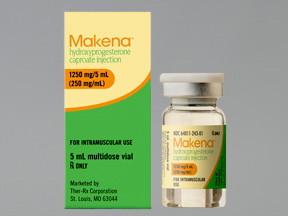HYDROXYPROGESTERONE CAPROATE - INJECTION
PHONETIC PRONUNCIATION: (hye-DROX-ee-proe-JES-ter-one KAP-roe-ate)
COMMON BRAND NAME(S): Makena
GENERIC NAME(S): hydroxyprogesterone caproate/PF
Uses
USES: This medication is used in women who are pregnant with a single baby, and who have delivered a baby too early (preterm) in the past. It is used to help lower the risk of having a preterm baby again. Hydroxyprogesterone is a man-made form of a female hormone (progestin). It is not known how it works to prevent preterm births. This medication is not intended to prevent preterm birth in women pregnant with more than one baby (such as twins, triplets). It is also not intended to stop active preterm labor.
How to use HYDROXYPROGESTERONE CAPROATE - INJECTION
HOW TO USE: Read the Patient Information Leaflet if available from your pharmacist before you start using hydroxyprogesterone and each time you get a refill. If you have any questions, ask your doctor or pharmacist. This medication is given by injection as directed by your doctor, usually once a week (every 7 days). The injection is given by a health care professional, either under the skin of your upper arm or into the muscle of your buttocks. You will start receiving injections any time from the 16th week through the 20th week of your pregnancy. You will continue to receive injections once a week until week 37 of your pregnancy or when your baby is delivered, whichever comes first. Use this medication regularly to get the most benefit from it.
Side Effects
Precautions
Interactions
Overdose
Images
Reviews
Faq for HYDROXYPROGESTERONE CAPROATE - INJECTION
Hydroxyprogesterone caproate is a medication that is injected into the muscle to prevent preterm birth in women who have had a previous preterm delivery.
Hydroxyprogesterone caproate works by helping to maintain pregnancy by reducing the risk of preterm birth.
Hydroxyprogesterone caproate is given as an injection into the muscle, usually in the buttocks.
Hydroxyprogesterone caproate is usually given once a week, beginning between the 16th and 20th week of pregnancy and continuing until the 37th week.
The most common side effects of hydroxyprogesterone caproate include pain at the injection site, swelling or itching at the injection site, hives, rash, and nausea.
Serious side effects of hydroxyprogesterone caproate are rare but can include blood clots, allergic reactions, and liver problems. It is important to seek medical attention if any of these occur.
There is limited information on the use of hydroxyprogesterone caproate during breastfeeding, so it is best to consult with a healthcare provider before using this medication while breastfeeding.
Hydroxyprogesterone caproate should be used with caution in women with a history of blood clots. A healthcare provider will assess the risks and benefits before prescribing this medication.
Hydroxyprogesterone caproate is typically considered safe for use in all trimesters of pregnancy. However, it should only be used under the guidance of a healthcare provider.
Disclaimer
IMPORTANT: HOW TO USE THIS INFORMATION: This is a summary and does NOT have all possible information about this product. This information does not assure that this product is safe, effective, or appropriate for you. This information is not individual medical advice and does not substitute for the advice of your health care professional. Always ask your health care professional for complete information about this product and your specific health needs.


No Reviews Yet